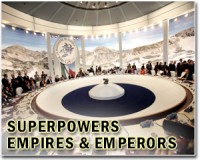| . |  |
. |
Brussels (AFP) July 16, 2010 A sharp split emerged Friday between Russia and NATO over how to relaunch their security dialogue, highlighting a lingering mutual mistrust two years after the Russia-Georgia war. The 28 NATO nations rejected a new treaty proposed by Moscow to revamp the NATO-Russia Council, a body created in 2002 for the two former Cold War foes to hold a dialogue on security issues, a NATO diplomat told AFP. "The allies prefer an improvement of the military cooperation with Moscow," the diplomat said after a meeting of NATO-Russia Council ambassadors in Brussels. "We are in favour of improving cooperation and showing great openness towards Russia, but not for signing a restrictive treaty," the diplomat said, adding that NATO wants the dialogue to continue on the basis of its founding principles. The two sides agreed last year to revive the Russia-NATO Council after it was frozen following Moscow's brief war with Georgia. But suspicions remain, with the trans-Atlantic alliance careful not to let Moscow win a say in its affairs while Russia worries about the US-led alliance expanding too closely to its borders. NATO insists on negotiating with Russia through other international forums such as the Organisation for Security and Cooperation in Europe (OSCE). For its part, Russia has sought to block NATO efforts to recruit new members in the former Soviet bloc such as Ukraine. The treaty on the NATO-Russia Council, which Russian Foreign Minister Sergei Lavrov first invoked in December during a reconciliation meeting with NATO counterpart, reflects this concern. The text has not been made public, but the West appears concerned about a chapter on "the definition of combat troops," Russia's ambassador to NATO, Dmitry Rogozin, told reporters. "The discussion is not over but the trend is visible. NATO continues to want to avoid defining its troops," Rogozin said. Moscow wants to prevent the stationing of "foreign" troops near Russia's borders but not the development of Polish or Romanian troops, he told AFP, in an allusion to US soldiers. The envoy said it was "totally unacceptable" for NATO members to refuse to discuss such a sensitive issue and that "higher level talks may be necessary" to break the deadlock. But NATO and Russia would have to agree on three key points to justify a summit between Russian President Dmitry Medvedev and his Western counterparts, he said. NATO's new strategic concept, to be adopted at a summit in Lisbon in November, cannot refer to Russia as a danger, Rogozin said. The trans-Atlantic alliance and Moscow must also positively conclude their talks on mutual threats and the planned US anti-missile system in eastern Europe cannot be unilaterally deployed without Russia's approval, he said.
Share This Article With Planet Earth
Related Links Learn about the Superpowers of the 21st Century at SpaceWar.com Learn about nuclear weapons doctrine and defense at SpaceWar.com
 No decision for Brazil, Turkey to join Iran talks: diplomats
No decision for Brazil, Turkey to join Iran talks: diplomatsVienna (AFP) July 11, 2010 World powers have not formally agreed that Brazil and Turkey can sit in on talks over a nuclear fuel supply deal with Iran, but neither have they explicitly ruled out such an arrangement, diplomats said Monday. An Iranian news report on Sunday quoted Tehran's foreign minister Manouchehr Mottaki as saying that the so-called Vienna group "has accepted" the presence of Brazil and Turkey in talk ... read more |
|
| The content herein, unless otherwise known to be public domain, are Copyright 1995-2010 - SpaceDaily. AFP and UPI Wire Stories are copyright Agence France-Presse and United Press International. ESA Portal Reports are copyright European Space Agency. All NASA sourced material is public domain. Additional copyrights may apply in whole or part to other bona fide parties. Advertising does not imply endorsement,agreement or approval of any opinions, statements or information provided by SpaceDaily on any Web page published or hosted by SpaceDaily. Privacy Statement |